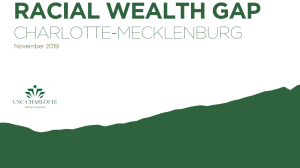Publications & Reports

Does where you live — and what jobs you have access to — influence whether you work, and how much you earn? The long-held “spatial mismatch” theory posits that inner city unemployment and poverty has been driven in large part by the increasing physical separation of inner city residents from job opportunities, as suburbs boomed […]

Charlotte is a city with growth embedded in its DNA, a community where striving to be “world-class” has both propelled us forward and papered over many disparities just beneath the surface. And Charlotte’s growth shows no signs of slowing down. With a host of plans coming together in 2021 that will set the city’s path […]

Mecklenburg County Community Support Services recently released the Single Adult Homelessness Integrated Data (SAHID) Report. This is the first community report focused specifically on single adult homelessness. The report is part of the Charlotte-Mecklenburg Housing Instability & Homelessness Report Series, which is funded by Mecklenburg County Community Support Services and completed by the UNC Charlotte […]

This article was written by the UNC Charlotte Urban Institute. Data used in this series was collected in partnership with Leading on Opportunity, Opportunity Insights, Communities in Schools, YMCA of Greater Charlotte, Foundation For The Carolinas, and SHARE Charlotte, with staff funding from The Gambrell Foundation. See more results from the 2019 Mecklenburg Social Capital […]

In the shadow of COVID-19, it’s easy to lose sight of the strides Charlotte-Mecklenburg has made to address chronic homelessness. Housing First Charlotte-Mecklenburg (HFCM) was launched in 2015 to end chronic homelessness in Charlotte-Mecklenburg by scaling housing first, particularly by expanding the housing first permanent supportive housing model. Through HFCM and the continued work of […]
This article was written by the UNC Charlotte Urban Institute. Data utilized in this series was collected in partnership with Leading on Opportunity, Opportunity Insights, Communities In Schools, YMCA of Greater Charlotte, Foundation For The Carolinas and SHARE Charlotte, and with staff funding from The Gambrell Foundation. To see more results from the 2019 Mecklenburg […]

COVID-19 has had an immediate and potentially lasting impact on the housing stability of low-income renters in Charlotte and the nation. Although the Centers for Disease Control and Prevention recently announced a federal eviction moratorium through the end of 2020, missed rent is not being forgiven. Renters need assistance to avoid often insurmountable back rents […]

Housing First Charlotte-Mecklenburg (HFCM) was launched in 2015 to end chronic homelessness in Charlotte-Mecklenburg by scaling housing first, particularly the housing first permanent supportive housing model. Housing first programs prioritize housing as an early step in service delivery, have low-barrier admissions policies, maximize client choice in housing and services, use a harm reduction approach to […]

Last week’s blog post provided an in-depth look at the key findings from The Child & Youth Homelessness Integrated Data Report, which was released on July 9. The new report integrates data from multiple sources to describe child and youth homelessness and service utilization patterns in Charlotte-Mecklenburg. The first blog post in the series covering […]

Last week’s blog post featured the release of The Child & Youth Homelessness Integrated Data Report, which integrates data from multiple sources to describe child and youth homelessness and service utilization patterns in Charlotte-Mecklenburg. The blog post provided context about the the report, including how integrated data can help communities to understand and address complex […]

Housing instability and homelessness has negative short-term and long-term impacts on children and youth experiencing homelessness. Immediate effects include increased absences from school; lower scores on reading and math End of Grade tests; and greater risks of dropping out of high school. As children and youth age into adults, long-term effects can also impact mental […]

This series was based on a report by the Charlotte Urban Institute, compiled with support from Bank of America, which partners with the Charlotte Urban Institute and the Charlotte Regional Data Trust on research that provides insight into community initiatives. In the United States, White households have 10 times the wealth of Black households and […]